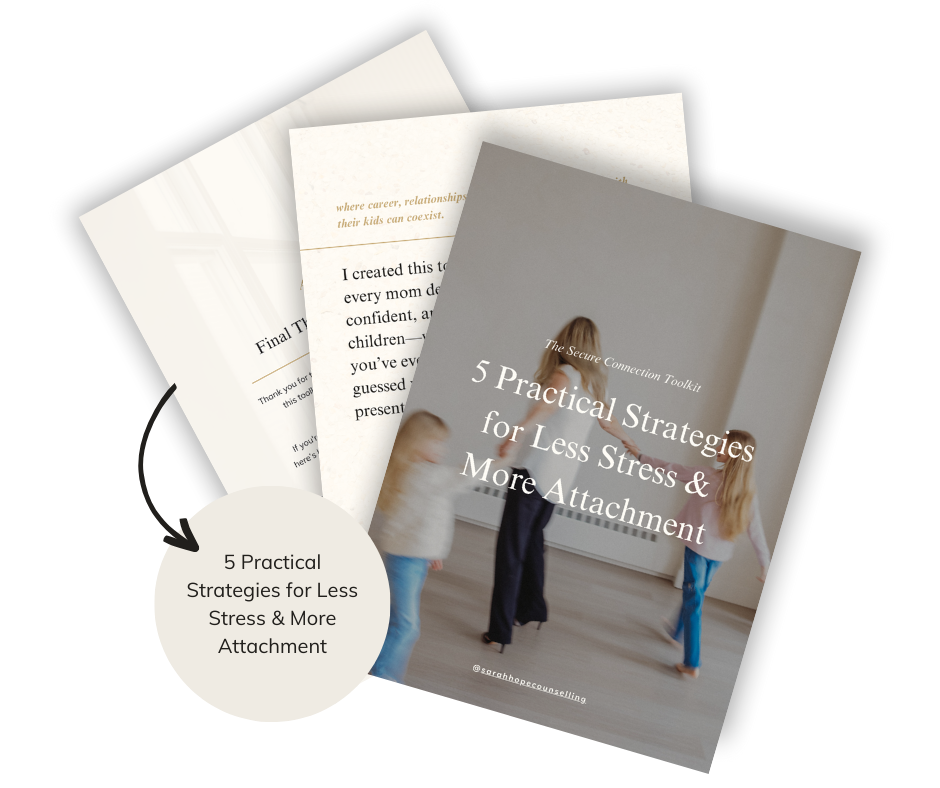Trauma therapy in Niagara Falls, Ontario
Healing from trauma is not about forgetting the past—it is about learning how to live fully in the present without being controlled by it. Through trauma therapy, I help clients process painful experiences, regulate their nervous systems, and build resilience so they can move forward with confidence and self-trust.
I’m Sarah Hope, a therapist in Niagara Falls, Ontario, specializing in helping high-achieving women break free from burnout and reclaim balance in their lives. Trauma can leave lasting emotional and physical imprints, making it difficult to feel safe, present, or in control. If you or someone you know is struggling with the effects of trauma, therapy can help.
What is trauma therapy?
Trauma therapy is designed to help individuals process and heal from distressing experiences that continue to impact their emotional, mental, and physical well-being. Trauma can stem from a single overwhelming event or chronic stress over time, including:
- Childhood neglect or abuse
- Emotional, physical, or sexual violence
- Medical trauma or life-threatening experiences
- Loss of a loved one or sudden grief
- High-pressure work environments or burnout
- Relationship trauma, including betrayal or toxic dynamics
Trauma therapy provides a safe, supportive space to explore these experiences and develop healthier coping mechanisms.
Most common symptoms of trauma
Trauma affects people in different ways, often showing up in both emotional and physical symptoms, including:
- Feeling anxious, irritable, or constantly on edge
- Trouble concentrating or feeling disconnected from the present
- Flashbacks, nightmares, or intrusive thoughts about past events
- Avoidance of people, places, or situations that trigger distress
- Difficulty trusting others or forming close relationships
- Chronic fatigue, tension, or unexplained physical pain
If any of these symptoms feel familiar, know that you do not have to carry this alone.
How do I know if I need trauma therapy?
Trauma is not just about what happened—it is about how it continues to affect you. If you find yourself struggling with any of the following, trauma therapy may help:
- Do I feel emotionally overwhelmed or numb when facing reminders of past events?
- Do I avoid certain people, conversations, or places to prevent emotional distress?
- Do I struggle with self-worth, trust, or forming healthy relationships?
- Do I experience panic, hypervigilance, or dissociation?
- Am I using work, food, or distractions to suppress difficult emotions?
Recognizing the impact of trauma is the first step toward healing. Therapy provides the support needed to process experiences in a way that feels safe and empowering.
How I treat trauma in Niagara Falls, Ontario
I take an integrative, somatic-based approach to trauma therapy, focusing on both the mind and body to create lasting healing. Many people who have experienced trauma carry unresolved stress in their nervous systems, which is why body-based therapies are a critical part of the healing process.
- Somatic therapy – Helps you reconnect with your body, release stored trauma, and regain a sense of safety within yourself
- Trauma-informed cognitive behavioral therapy (CBT) – Identifies and shifts negative thought patterns developed as a result of trauma
- Mindfulness & nervous system regulation – Teaches you practical tools to calm the body’s fight-or-flight response and reduce anxiety
- Compassionate processing – Provides a safe space to work through painful memories without being retraumatized
Trauma therapy is not about reliving the past—it is about gaining control over how it affects you today.
What topics can we talk about in trauma therapy?
- Understanding how trauma affects the nervous system and body
- Learning emotional regulation and grounding techniques
- Processing painful memories in a safe and supportive way
- Rebuilding trust in yourself and others
- Addressing perfectionism, control patterns, and burnout
- Navigating relationships after experiencing trauma
- Understand the root cause of your addiction and why certain behaviors feel hard to change
- Develop healthier coping skills to manage stress, emotions, and triggers
- Improve relationships by learning to communicate needs and set boundaries
- Increase self-awareness and self-compassion, reducing feelings of guilt and shame
- Create long-term change, replacing destructive habits with healthier, more sustainable choices
Ready to get started?
Book an intro call
We'll explore your current struggles in your motherhood journey and explore if my therapy can be a good fit for your needs right now.
Personalized, one-on-one sessions
Each session is designed specifically for you. Whether we’re addressing burnout, anxiety, relationship issues, or navigating the complexities of motherhood, you’ll receive guidance that’s tailored to your unique experiences and needs.
Evidence-based therapeutic techniques
We’ll use a blend of proven, evidence-based methods including Acceptance and Commitment Therapy (ACT), Cognitive Behavioral Therapy (CBT), and trauma-informed practices. These tools will help you understand the root causes of your struggles and empower you with the skills to break free from cycles of guilt, perfectionism, and overwhelm.
Trauma therapy in Niagara Falls, Ontario
I specialize in helping high-achieving women heal from trauma, burnout, and emotional exhaustion. Whether the trauma stems from childhood, relationships, or life’s unexpected challenges, I provide a personalized, compassionate approach that supports deep healing and long-term resilience.
You do not have to go through this alone. Therapy offers the space and tools needed to process past experiences in a way that empowers you to move forward with clarity, confidence, and self-trust.
Tips & resources for coping with trauma in Niagara Falls, Ontario
- Practice grounding techniques – Try deep breathing, movement, or sensory exercises to help regulate emotions
- Seek supportive community spaces – Local organizations offer trauma-informed support:
- Set boundaries around triggers – Protect your energy and give yourself permission to step away when needed
- Find a healthy emotional outlet – Journaling, creative arts, or movement-based practices can help process emotions
- Be patient with yourself – Trauma healing is a journey, and progress does not have to be linear

Hello! I'm Sarah Hope
Therapist for high-achieving moms and women in Niagara Falls, St Catharines and across Ontario
I help high-achieving moms out of burnout and into balance—where career, relationships, and a guilt-free connection with their kids can coexist.

Book your Trauma Therapy in Niagara Falls, Ontario
FAQ
What happens in a trauma therapy session?
Sessions focus on understanding how trauma affects you, learning coping strategies, and working through past experiences at a pace that feels safe and manageable.
Do I have to talk about my trauma in detail?
No, trauma therapy does not require reliving painful experiences. Somatic and mindfulness-based approaches help process trauma without retraumatization.
How long does trauma therapy take?
Healing looks different for everyone. Some clients see progress in a few months, while others benefit from ongoing support. The goal is sustainable, long-term healing.
How does trauma therapy work?
Trauma therapy combines evidence-based approaches like somatic therapy, cognitive behavioral therapy (CBT), and nervous system regulation to help process distressing experiences, release stored emotional tension, and develop healthier coping strategies.
Can trauma be healed completely?
While trauma may always be part of your story, healing is possible. Therapy helps rewire how the brain and body respond to past experiences, reducing distress and allowing you to move forward with greater peace, confidence, and emotional resilience.
